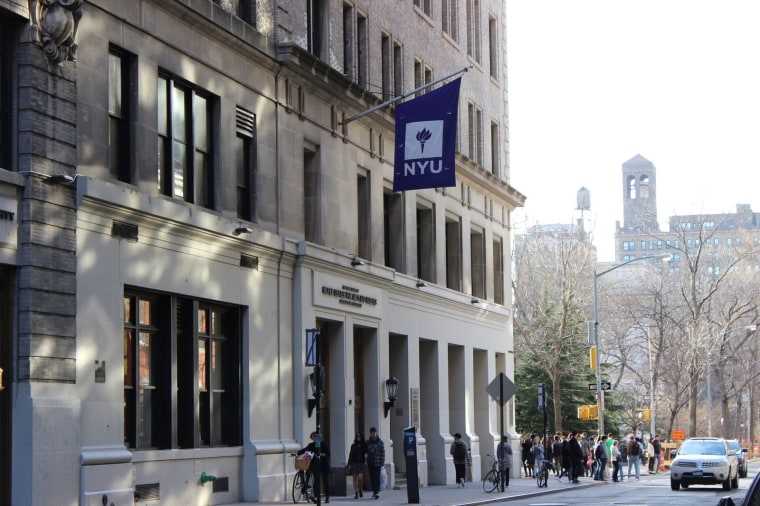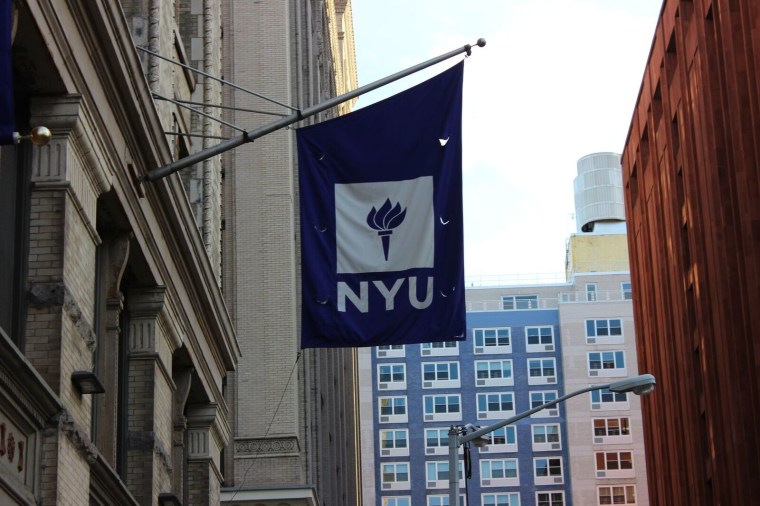The Trump administration's stance toward immigration enforcement and its clashes with sanctuary cities is stirring action on college campuses.
In New York City, a coalition of students and faculty at New York University want the institution to officially declare itself a sanctuary campus, saying universities have to be clear about standing by their community.

“I’ve had students crying in my office because they’re really scared: students with unauthorized status, students on visas, family in Iran," said Cristina Beltrán, a professor of Social and Cultural Analysis at NYU, in an interview with NBC Latino.
On March 27th Attorney General Jeff Sessions announced that American cities and states that refuse to hand over undocumented immigrants for deportation would be punished through the denial of federal funds targeted to state and local law enforcement. In cities like New York and Seattle, local leaders remain defiant about their sanctuary city designation.
But on college campuses, the use of the word sanctuary among institutions wishing to make statements of support for students and faculty has become a bit of a nationwide debate.
Some universities like Swarthmore and Wesleyan have made clearly defined declarations using the word sanctuary.
But others take a different position. In a January New York Times article, University of California president Janet Napolitano, despite implementing several protections of financial aid to DACA students in the event of that law’s potential repeal, does not warm up to it.
“Sanctuary is such a vague term, we don’t use it,” she said.
NYU President Andrew Hamilton said in a declaration that the institution will not “allow any federal agency to enter NYU buildings without permission or legal process…for targeting undocumented members of our community.” Hamilton listed several measures to be taken in a November letter, expressing a commitment to affected international students as well as those of undocumented status.
RELATED: ‘We Cannot Hide’: Sanctuary Cities Join Forces in First Meeting of Its Kind
But the NYU Sanctuary Coalition argues Hamilton has stopped short of using the label “sanctuary,” echoing Napolitano in a recent town hall with students. Hamilton said he doesn’t believe “it is wise for this university to use terms that have no meaning.”
It’s been suggested by some legal observers that while vague, the "sanctuary" wording may lock universities into defying the law to shelter those of undocumented status.
But Beltrán and others think the administration needs to take a strong stand.“We need a clear public commitment that we are standing with the most vulnerable segments of the NYU community," she said.
RELATED: Opinion: Sanctuary Cities are Lawful Exercise of Local Government Authority
Izzy Khoufaify is an NYU sophomore majoring in Public Policy who grew up in Orange County, New York and whose parents are originally from Morocco. “The administration has this narrative that sanctuary has no meaning - so what we’re trying to do is give it a meaning.”
Khoufaify was referring to the effort the NYU Sanctuary Coalition made to come up with a list of specific measures the administration should take ahead of a scheduled meeting with President Hamilton on April 4th.
He listed several measures to be taken in a November letter, expressing a commitment to affected international students as well as those of undocumented status.
The demands include financial aid and employment for DACA students if that law is repealed; on-campus housing for noncitizen and international students who are hesitant to travel because of the executive order travel ban; expanded access to health care and mental health services for affected students; and expanded legal support for those students.
“Sanctuary would alleviate the stress and trauma that comes with fears over ICE,” said Karla Reyes, an MA student in Media, Culture and Communication who hails from San Diego and was alarmed that a recent job fair at NYU Law School gave ICE recruiters a space on campus.
Reyes has long felt concerned; she comes from an organizing background that works with communities where families with mixed citizenship status are common.
“My own family has been concerned about traveling,” she sighed. “My dad is not a citizen and graduation’s coming in May and my mom is very nervous about that.”
Although the Trump administration’s attack on sanctuary cities is usually associated with his extreme rhetoric against undocumented Mexican and Central American immigrants, the travel ban executive order has created a new solidarity between those constituencies and international students from Muslim countries.

“I don’t even look at the Muslim ban and immigration as two separate issues,” said Khoufaify. “These issues overlap. You can belong to multiple movements and fight for other people as well as yourself.”
Kianna Karima is a graduate student in Performance Studies who confronted President Hamilton in the town hall.
“NYU Sanctuary Coalition is one of the only spaces at NYU where the group is absolutely diverse,” said Karima, who is from Iran. She was personally affected by the travel ban when she returned from Egypt two days after its implementation in January.
“I was questioned about my background, why I had traveled to Egypt. Some people in the room with me were there for hours. It was a very different experience than I’ve ever had entering the U.S.”
The students are strongly aware that intersectional coalitions are forming, bringing together activists from women’s movements, like Olivia Gagnon, a PhD student in Performance Studies who helped organize a Women's Strike at NYU in March.
"One of the challenges of using the term sanctuary is finding a way to expand it, because so many folks are under attack, without diluting it," said Gagnon. "In this, we're following the lead of Latinx immigrant rights organization Cosecha, who use the term to specifically protect undocumented folks, while also opening it up to include other populations who are increasingly vulnerable.”
RELATED: Some Universities Urge Students to Use Caution, Delay Travel After Trump Restrictions
Aree Worawongwasu, an international undergraduate student from Thailand, says she thrives in the environment, and feels empowered by finding solidarity with others. She even drew a spiritual parallel to the meaning of sanctuary in her homeland.
“I come from a Thai Buddhist background and the temple is seen as a space of sanctuary historically. A lot of women who are facing domestic abuse can go to the temple and receive food and security.”
Clearly the word sanctuary means different things to different people. The NYU administration’s hesitancy to use it could stem from how it potentially makes the school a target for the enforcement of deportation orders and ICE raids, or the idea that it would guarantee a physical space of safety no matter what.
In a statement to NBC Latino, NYU Vice President for Public Affairs stated: “We believe that what connects the University administration and those calling for a declaration of sanctuary campus is much stronger than what divides us...Where NYU finds itself in disagreement…is over the advisability of declaring NYU a sanctuary campus."
Beckman added that there is no commonly accepted definition of sanctuary campus. "As such a declaration would confer no great protection on our people; it would give NYU no greater authority to safeguard or assist it students, faculty, and staff," according to the statement. "The vagueness of the term sanctuary campus could, in fact, be harmful: it might cause people on our campus to feel some new, special level of reassurance which we may be unable to meet.”
Yet many students have raised the criticism that ardent Trump supporters John Paulson, a major NYU donor, and billionaire Home Depot owner Ken Lagnone both sit on the university’s Board of Trustees, speculating that they may be behind Hamilton’s reticence.
Regardless, Professor Beltrán fears that the Trump administration, in the wake of its health care proposal’s defeat, the continuing controversy over allegations of collusion with Russia and the precariousness of its plan to cut taxes may see an easy political play to its base with a strong crackdown on Latino immigrants and Muslims.
“[The Sessions announcement] actually makes the need for NYU sanctuary even more important, because before one could say that New York was a sanctuary city so we don’t need to worry about this,” said Beltrán. “But now it’s like the city’s capacities are in question. A sanctuary university is about enacting the world as we want it to be. This is where we need to stand up. We want to be a brave institution in scary times.”